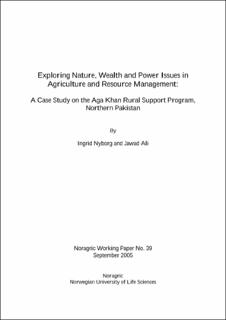| dc.contributor.author | Nyborg, Ingrid | |
| dc.contributor.author | Ali, Jawad | |
| dc.coverage.spatial | Pakistan | en_US |
| dc.date.accessioned | 2020-09-30T12:30:03Z | |
| dc.date.available | 2020-09-30T12:30:03Z | |
| dc.date.issued | 2005-09 | |
| dc.identifier.issn | 0809-4934 | |
| dc.identifier.uri | https://hdl.handle.net/11250/2680549 | |
| dc.description | The study leading to this Working Paper was funded by the US Agency for International Development (USAID) and the results will be published in a forthcoming [2005] USAID publication. | en_US |
| dc.description.abstract | The Aga Khan Rural Support Program (AKRSP) works in the Northern Areas and Chitral (NAC) regions of Pakistan where it specifically addresses the needs of the poorer rural population through a focus on poverty reduction and increased incomes. The experiences of AKRSP working with village-based organizations in both agricultural development and resource management offer a unique opportunity to examine aspects of environment, wealth and power in the challenging context of the NAC. The program has been evaluated several times by the World Bank and is considered highly successful in terms of relevancy and efficiency. In this paper we present some of the main achievements of AKRSP, particularly in forestry and natural resource management. We discuss AKRSP’s particular participatory and democratic approach to development, and the implications of this approach in dealing with power relations in local institutions and government agencies. In terms of environmental activities, we explore AKRSP’s experience in tackling issues such as incentives for conservation, investment in environmental management and the development of democratic institutions for resource management. We argue that the lessons to be learned from AKRSP’s experiences lie more in a study of processes and principles rather than specific activities. This highlights the need for a different kind of competence on the part of development agents, particularly at the local level, where they must be able to analyze the appropriateness and effectiveness of natural resource management activities in their particular context, rather than merely implementing a set of activities proven effective elsewhere. | en_US |
| dc.language.iso | eng | en_US |
| dc.publisher | Norwegian University of Life Sciences, Ås | en_US |
| dc.relation.ispartofseries | Noragric Working Paper;39 | |
| dc.title | Exploring Nature, Wealth and Power Issues in Agriculture and Resource Management: A Case Study on the Aga Khan Rural Support Program, Northern Pakistan | en_US |
| dc.type | Working paper | en_US |
| dc.subject.nsi | VDP::Social science: 200::Human geography: 290 | en_US |
| dc.subject.nsi | VDP::Agriculture and fishery disciplines: 900::Agriculture disciplines: 910::Management of natural resources: 914 | en_US |
| dc.source.pagenumber | 42 | en_US |
